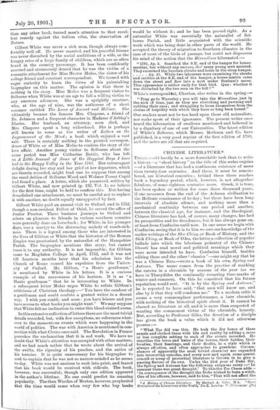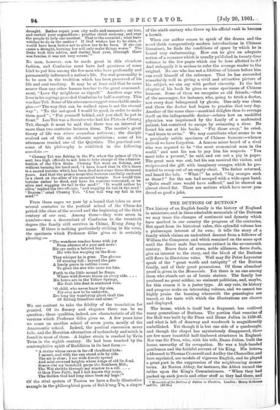CHINESE LITERATURE.*
THEIZE could hardly be a more formidable task than to write a history—a "short history" as the title of this series enjoins —of a literature that has had a continuous existence of . more than twenty-four centuries. And these, it must be remem- bered, are historical centuries ; behind these there reaches back a legendaly period, which, however, is not altogether fabulous, of some eighteen centuries more. Greek, it is true, has been spoken or written for some three thousand years, if one measures from the end of the Achtean civilisation to
the Hellenic renaissance of to-day ; but there have been long intervals of absolute silence, and nothing more than a mechanical continuity between one period and another, between the classical age, for instance, and the theological.
Chinese literature has had, of course, many changes, has had its prosperities and its decadences, but it has always gone on, at least from Confucius until now. In one sense we begin with Confucius, seeing that it is to him we owe our knowledge of the earlier writings of the Shu, Ching, or Book of History. and the Shih Ching, or Book of Odes, the latter a collection of popular ballads into which the laborious pedantry of the Chinese literati has read moral and political meanings which they were never intended to have. Confucius himself, besides editing these and the other" classics "—one might say that he was a Chinese Ezra—wrote a book of his own, Spring and Autumn. The name comes from the practice of marking the entries in a chronicle by seasons of the year (as we have in Thucydides the continually recurring time-marks of winter and summer). On this he conceived that his future reputation would rest. "It is by the Spring and Autumn," he is reported to have said, "that men will know me, and also by it that they will condemn me." To a modern critic it seems a very commonplace performance, a bare chronicle, with nothing of the historical spirit about it. It cannot be classed as literature at all, and it is more than suspected of wanting the commonest virtue of the chronicle, honesty.
But., according to Professor Giles, the devotion of a disciple' has given the book a value which it did not otherwise possess
What Tao did was this. He took the dry bones of these annals and clothed them with life and reality by adding a more or less complete setting to each of the events recorded. He describes the loves and hates of the heroes, their battles, their treaties, their feastings, and their deaths, in a style which is always effective, and often approaches to grandeur. Circum- stances of apparently the most trivial character are expanded into interesting episodes, and every now and again some quaint conceit or scrap of proverbial literature is thrown in to give a passing flavour of its own. Under the 21st year of Duke Hsi, the Spring and Autumn has the following exiguous entry :—` In summer there was great drought.' To this the Tso Chuan adds — 'In consequence of the drought the Duke wished to burn a witch. One of his officers, however, said to him, "That will not affect the A History of Chinese Literature. By Herbert A. (Meg. MA. "Short Histories of the Literatures of the World," No. X. Loudon: W. Ileinetuausl. 166.3
drought. Bather repair your city walls and ramparts ; eat less, and curtail your expenditure ; practise strict economy, and urge the people to help one another. That is the essential ; what have witches to do in the matter ? If God wishes her to be slain, it would have been better not to allow her to be born. If she can cause a drought, burning her will only make things worse." The Duke took this advice, and during that year, although there was famine, it was not very severe.'" No man, however, can be made great in this vicarious fashion, and Confucius must have had greatness of some kind to put him among the few men who have profoundly and permanently influenced a nation's life. For real personality is to be seen in the tradition which has been preserved of his life and oral teaching. It may be at least said that he came nearer than any other human teacher to the great command- ment, "Love thy neighbour as thyself." Another sage who lives in his sayings preceded Confucius by half-a-century. This was Lao Tzii. Some of his utterances suggest remarkable analo- gies :—" The way that can be walked upon is not the eternal way " ; "To the not-good I would be good, in order to make them good " ; "Put yourself behind, and you shall be put in
front." Lao Tail was a Socrates who had his Plato in Chuang Tzii, though it must be said that there was an interval of more than two centuries between them. The master's great theory of life was vivere secundum nature), ; the disciple evolved out of this an elaborate mysticism ; some of his
utterances remind one of the Quietists. The practical out- come of his philosophy is exhibited in the following anecdote :— " Chuang Tail was fishing in the Pa when the prince of Ch`u sent two high officials to ask him to take charge of the adminis- tration of the Ch‘a State. Chuang Tail went on fishing, and without turning his head said, have heard that in Ch'u there is a sacred tortoise which has been dead now some three thousand years. And that the prince keeps this tortoise carefully enclosed in a chest on the altar of his ancestral temple. Now would this tortoise rather be dead, and have its remains venerated, or be alive and wagging its tail in the mud ? " It would rather be alive,' replied the two officials, and wagging its tail in the mud.' Begone !' cried Chuang Tail. too will wag my tail in the mud."
From these sages we pass by a bound that takes us over several centuries to the poetical school of the Chien-An period (the close of the second and the beginning of the third century of our era). Among them— they were seven in number—was a descendant of Confucius in the twentieth degree (the family still survives in China), IC`ung Jung by name. If there is nothing particularly striking in his verse, the specimen which Professor Giles gives us is certainly pleasing
" The wanderer reaches home with joy From absence of a year and more : His eye seeks a beloved boy—
His wife lies weeping on the floor.
They whisper he is gone. The gloms Of evening fall ; beyond the gate A lonely grave in outline looms To greet the sire who came too late.
Forth to the little mound he flings, Where wild-flowers bloom on every side. . . .
His bones are in the Yellow Springs, His flesh like dust is scattered wide.
'0 child, who never knew thy sire, For ever now to be unknown, Ere long thy wandering ghost shall tire Of flitting friendless and alone."
We are content to take the fidelity of the translation for granted. Of its fluency and elegance there can be no question; these qualities, indeed, are characteristic of all the versions which Professor Giles gives us. A few years later we come on another school of seven poets, mostly of the Anacreontic schooL Indeed, the poetical succession never fails, and the Horatian alternation of melancholy and mirth is found in most of them. A higher strain is reached by Ts'en Ts'an in the eighth century. He had been touched by the contemplative spirit of Buddhism in its best form :—
" A shrine whose eaves in far-off cloudland hide : I mount, and with the sun stand side by side. The air is cleat; I see wide forests spread And mist-crowned heights where kings of old lie dead. Scarce o'er my threshold peeps the Southern Hill; The Wei shrinks through my window to a rill. . . . 0 thou Pare Faith, had I but known thy scope, The Golden God had long since been my hope!"
Of the rival system of Taoism we have a finely illustrative example in the philosophical poem of Ssti-leung VII, a singer of the ninth century who threw up his official rank to become a hermit.
When our author comes to speak of the drama and the novel (both comparatively modern introductions in Chinese literature), he finds the conditions of space by which he is bound very embarrassing. How can be give an adequate notion of a romance which is usually published in twenty-four volumes iu the few pages which can be here allotted.to it P And unhappily it is useless to refer the average reader to the original. No one who has not a lifetime of leisure before him can avail himself of the reference. That he has succeeded remarkably well in giving a vivid and attractive picture of his subject, we can say with perfect sincerity. In the last chapter of his book he gives us some specimens of Chinese humour. Some of them we recognise as old friends,—that of the messenger, for instance, who, going to fetch a doctor, saw every door beleaguered by ghosts. One only was clear, and there the doctor had begun to practise that very day. Another of the same class—mankind delights thus to revenge itself on the indispensable doctor—relates how an unskilful physician was imprisoned by the family of a maltreated patient, but contrived to escape by swimming a river. He found his son at his books. "Put those away," he cried, "and learn to swim." We may contribute what seems to us a peculiarly subtle specimen of Chinese humour,—whence derived we have forgotten. A famous miser heard of a rival who was reputed to be "the most economical man in the world," and sent his son to pay him his respects. "You must take a present," he said, and cut out a pig in paper. The great man was out, but his son received the visitor, and reciprocated the gift with imaginary oranges, which he pre- tended to scoop out of an empty chest. The father returned, and heard the tale. " What !" he cried, "big oranges such as those P" for the son had scooped with a wide-open hand. "Quite small ones would have sufficed," and he showed an almost closed fist. There are nations which have never pro. duced so good a joke.



































 Previous page
Previous page